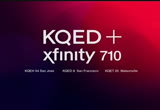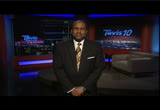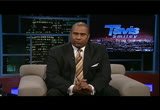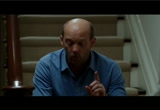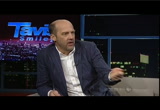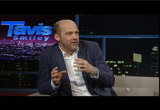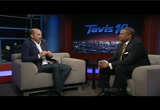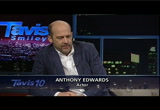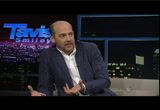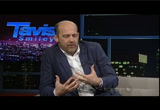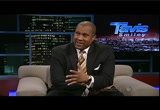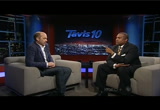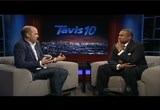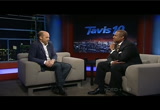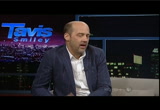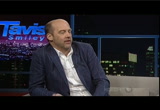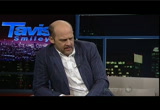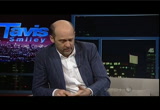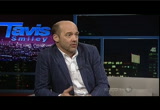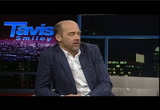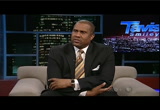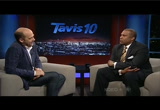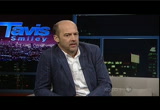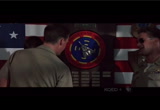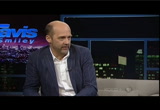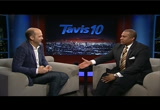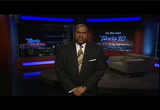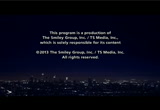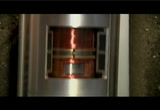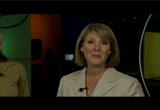tv Tavis Smiley PBS February 21, 2013 12:00am-12:30am PST
12:00 am
tavis: good evening. from los angeles, i am tavis smiley. tonight the conversation with anthony edwards, perhaps known es er.or the eighth seriou he is also the star of "zero hour." his film tackles the difficulties of military debts as they assimilate back into our society. we are glad you joined us. -- military events as they assimilate back into our society. >> there is a saying that dr. king had that said there is
12:01 am
always the right time to do the right thing. i try to live my life every day by doing the right thing. we know that we are only halfway to completely eliminating hunger and we have work to do. fighting hunger in the u.s. as we work together, we can stamp hunger out. >> and by contributions to your pbs station from viewers like you. thank you. tavis: anthony edwards currently stars in the new drama "zero hour." this is his first series since
12:02 am
starring as martin green in the hit series, er. he is currently involved in making a documentary about the challenges faced by military vets as they integrate into society. let's take a look at a scene ."om "zero hour >> you have been acting different. please just talk to us. >> i saw something, something i cannot explain. the guy looked like you? >> he did not look like me. he looked exactly like me. >> that does not make any sense. >> there has to be a rational explanation. >> don't you want to know him? ?ho he was pronounce
12:03 am
>> if i focus on that now i will drop the ball. >> then send me. i will get it. >> one condition. you tell them exactly nothing about where i am going. tavis: how you think about my efforts to describe the show? >> that is a scene. they have been advertising it. there is a lot of action. i am used to seeing explosions and running, but every once in while we have a conversation. >> i did my turn. how would you describe the show? >> i described it as a book you get at the beach and someone tells you have to read this spy thriller, and you start turning pages, and you cannot put it
12:04 am
down. it is a mystery. it puts you in this world. the fun starts in storytelling is that it was an idea that the writer knew the end. he was able to tell the story and lay it out in 13 stories, this mystery with a lot of reveal. the fun part is there was a big reveal every week. >> were you instantly drawn to it, or did it take some time to figure out this was the vehicle to return to network television? >> like everything, my life has always been a surprise, and i was surprised. i had been developing a series that was going to be a cable show, and that did not go.
12:05 am
six months later, my manager says, i like this. i could not stop reading. i thought, abc wants to take this kind of risk, i would love to be part of it. i have not seen anything this big on television. what made it risky to you? >> the visuals had to be great, and there is a ticking clock of storytelling that you have to be true to every week. for me, it is risky, and it sells very different. it has been eight years doing very realistic medical drama, and this harkens back to nazi germany, modern-day conspiracy theories.
12:06 am
every episode we are in a different country. it felt incredibly ambitious. argue there iscould always a risk in deciding to take time off now. it is a beautiful thing you did eight seasons on e r. i am not trying to count your money, but i assume you made a decent enough money to take some time off. it is a beautiful thing to exercise your agency, but isn't there a risk in the siting you want to step away from television for a while? >> i do not know. i started acting professionally when i was 16. i have always been able to support myself since then, and i kind of burned out ability to be able to, and my wife and i made a big decision we wanted to raise the kids in new york
12:07 am
met anyone have never who says, i wish to spend less time with my kids when they were younger. this is an opportunity to do that. i did it until a year and a half ago. they all looked at me and said, get out of here. when your wife and children say, you have cooked enough for us, we have to get back to work, only to say you have to do what feels right. i made some interesting movies over the last eight years. i got to work with david fisher. i had some creative challenges, but i knew nothing was going to compared to er. er was so huge that whatever i did i would have to feel as strongly about.
12:08 am
tavis: i want to go back to what you said. that is this notion you have never heard an adult say i regret i spent too much time with my kids. you are right. you can never get that back. what has been the take away from euayou? you want to spend time with your family. what has been the takeaway personally and professionally? >> everybody loves their children. when you get to spend time like an actor you need to reflect things and characters that are real and feel in a deep wave.
12:09 am
sadly you are not going to grow if you stay as you were when you were young. i could not imagine it every other -- any other way. i feel incredibly fortunate, and i really love doing itsel. tavis: if you were going to navigate to network television, but given how tv has changed, you are the expert here. given how tv has changed in the wrapped er, was brough
12:10 am
there any concern about coming back to television, which is nothing like what it was when you left? >> no, but i think the way television has changed is for the better. i do not think networks would be taking a risk for shows like we are doing eight years ago. now things are happening like homeland and downton abbey and more of that english style where they are telling stories in eight or 10 episodes. >> you were writing a vehicle for yourself for cable. that seems to be where there is so much activity.
12:11 am
>> because he is excited about this kind of storytelling. it is fun to be with somebody running a network saying, this is what i want to do. we are using the resources of network television. the other side of is they have been spending three or $4 million an episode, so they have the ability to really make which is fun to be part of, because having those extra cameras and having to shoot with that level of production, is fun. as much as i love independent
12:12 am
and gritty and the cable version, to tell this story, and we needed the ability to use cmgi and all the effects .riggered > tavis: when i last saw you we were in the old studio. when we were last year you were leaving the studio to head back to new york to continue your training for the new york marathon, which you were running to raise money for a charity that was attempting to do some wonderful work in kenya. i am pleased to lead your report you ran the marathon, you raise a good amount of money, but most importantly the project, i will let you take it from there. >> the reason why a i love being a part of something that is a grassroots, and you can see the effect of what we do.
12:13 am
when people donated -- i believe you donated as well. thank you a very much. i believe you were a part of something that came true, which as we were building the first children's hospital in sub- saharan africa. they do not have one hospital for pediatrics, so they will now because of generosity of people. that is an exciting thing. the organization is really one guy who spends his time in kenya, who is making these things happen on the ground, and a lot of us helped make this happen comi-con but it is an exciting thing. you could say, and -- make this happen, but it is an exciting thing. you could say, but as a way charity should work. it is hard, when you hear the stories of money getting lost. tavis: of all the things an
12:14 am
actor gets asked to do, things presented you might put your name on, how did this become a passion project for you? thwacks a simple thing for me was running. i -- >> a simple thing for me was running. i did not start jogging until i was 37 years old. i've put out my last cigarette and took care of health in a different way. i think that is a good example of what you need to get into something. you have to be a bit selfish. i enjoy running. through that i met someone else who enjoyed running, and he had the idea of wanting to do this to charity work. i could help support someone of's vision. that is exciting for me. that was the largest funder of
12:15 am
research, but it was based on the work of the people who created the organization, and they were a mother or father who did that. when i see someone doing something great, i want to support that. i get a great benefit out of that. tavis: you are obviously a documentarian, and this new project is about the military. your father was a vet. >> world war ii. tavis: tell me about this project. >> it is personal. my dad was fortunate. i got him to tell me this story about world war ii and his experience. the long story short is a was talking to an 87-year-old man in his recounting of the experience of the first days of combat , and i could see that terrified
12:16 am
18-year-old boy in incredible pain, and to see that was really moving as a son and also realizing there is probably a big disconnect in his life, the experience he had compared with what it is to be a hero, and he coincided with a great friend of mine, who has a real passion about telling their stories, because he is also hooked up with a doctor, who has come up with some therapies that is really making a difference helping these events and some late back into line, -- helping these vets back into life. we have these terrific numbers, more vets killing themselves.
12:17 am
we talked about the inability to take care of the people. it is terrific. we can do so much more to help. tavis: what are some of the major impediments to their proper reintegration? >> it seems to be things like this are complicated in the individual, and they need individual care. it is the same thing with autism. every kid is different in how they need to be treated. that ability to treat people individually and to see the signs and requires a lot of focus and a lot of energy, and we like things to be simple. we will put these vets here, and they would get the care. there is a lot of complication in relation to these disorders. tavis: what is your read on why it is this issue is 9 giving
12:18 am
greater priority in our -- is not given greater priority in our society? these people put their lives on the line for our freedom, and when they come back, we do not stick up for them the way we should. you are not the first person to say it. it has been this way since before vietnam. this is not even a news story, yet its own -- it does not seem to be placed high enough on the american agenda. now you come with another documentary to place those face- to-face with our own shortcomings. why does it exist? >> we are a society obsessed with use and money and sex, and that sells. it is hard to make-or challenges the region -- to make death or challenges,
12:19 am
whether you are physically or emotionally challenged not -- we do not lend it -- we are afraid of the ugly stuff because we do not have a lot of processes dealing with a. we can learn from it. others have an increasing ability of understanding the frailties of the human condition are as important as our successes, but because we are america, it is hard to celebrate our problems, which we can do better. tavis: i am curious. what did you take away from your father sitting with you and sharing with you his own stories, his own journey, his own personal narrative about his involvement in world war ii? how did that impact your as
12:20 am
chausson? >> it broke my heart in a way. -- how did that impact you as his son? >> it broke my heart in a way. i do not know if he was given a forum to process the pain he went through at 18 and the horror he saw, and it is something he has always had to go, it is ok. do not worry. , get over it,n of commo it is sad. i am really sorry he had that to deal with. son?: you have assigne knowing how we treat veterans back, your soncome
12:21 am
, and youant to enlist commo say to him? >> my initial is no. it is an interesting thing. i have also been around people and the military who love it, and they are good at it. it is obviously a job that has to be done, and you don't the people doing it are living with a are -- and you hope the people doing it are loving what they are doing and being supportive. if my seventh desire was to serve in the military or to be a policeman's -- is my son's desire was to serve in the military or to be a policeman, you want them to go in with the most amount of tools and intelligence you karen.
12:22 am
-- you can. tavis: i just read that top gun -- is it coming out in blu-ray? is there an anniversary coming comm? >> they will find some way to market it. >> there must be an anniversary. i do not remember the details. you are one of the stars. it is coming out in blu-ray. how many years ago was that? >> it must be 26 or 27 years ago. it is coming out in 3-d. what a gift as an actor. they can make you three- dimensional. excellent. it would be just that much more interesting to watch.
12:23 am
tavis: when you look back on that project, how you situation that in your ongoing corpus of work? >> it is not dissimilar to what we are talking about. there are things i could easily say, this is making the military looks so romantic, and on the , it is a commercial film made by some passionate people. we lost tony scott, who is doing things that made that movie special. i have a lot of different interests in my life. you end up around people like the different movies you are in for different reasons. in new york, there are a lot of
12:24 am
dr. franz. i love going to formula one races, -- there are a lot of doctor fans. i love going to formula one races, and people like top gun. there is a lot of adrenaline, and for people who love that stuff company that movie represents that. i am part of a circus. i definitely do not think i am from the serious part of the circus, but you can do different parts of the circuits that will represent different forms of entertainment. tavis: you are a great circus act. youm always glad to have eua come on. the new one is gone "zero hour regent -- is called "zero hour ." from los angeles, and as always,
12:25 am
keep the faith. >> let's do it, man. >> 5 more seconds. >> i am in. >> i am off. >> this is not good. engine two is out. come on. this is not geared. this is not good. >> the man is in trouble. he is heading out to sea. >> for more information on today's show, visit tavis smiley at pbs.org. tavis: hi, i'm tavis smiley. join me next time for a conversation with grammy winner ben harper and the harmonica virtuoso. that is next time.
12:26 am
we will see you then. >> there is a saying that dr. king had that said there is always the right time to do the right thing. by doing the right thing. we know that we are only halfway to completely eliminating hunger and we have work to do. walmart committed $2 billion to fighting hunger in the u.s. as we work together, we can stamp hunger out. pbs station from viewers like you. thank you. >> be more. >> be more. pbs. pbs.
103 Views
Uploaded by TV Archive on

 Live Music Archive
Live Music Archive Librivox Free Audio
Librivox Free Audio Metropolitan Museum
Metropolitan Museum Cleveland Museum of Art
Cleveland Museum of Art Internet Arcade
Internet Arcade Console Living Room
Console Living Room Books to Borrow
Books to Borrow Open Library
Open Library TV News
TV News Understanding 9/11
Understanding 9/11